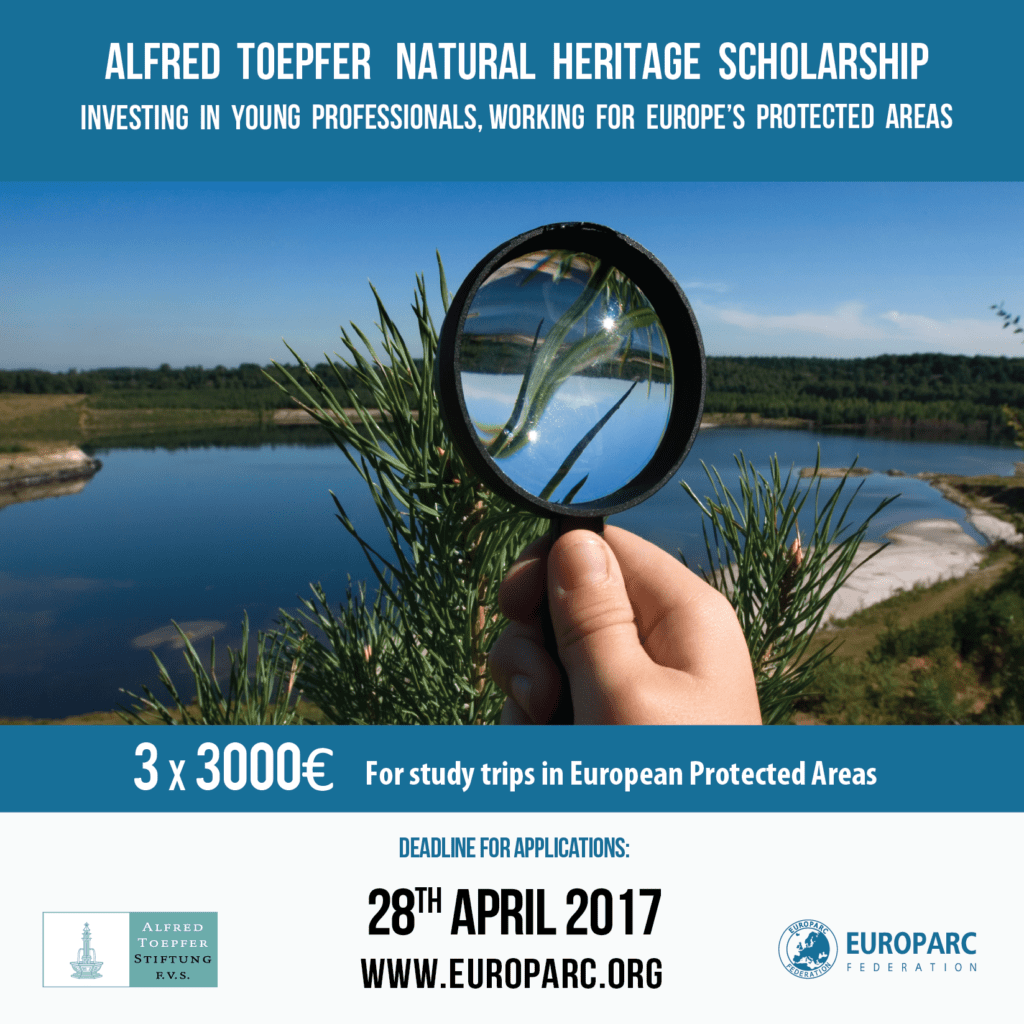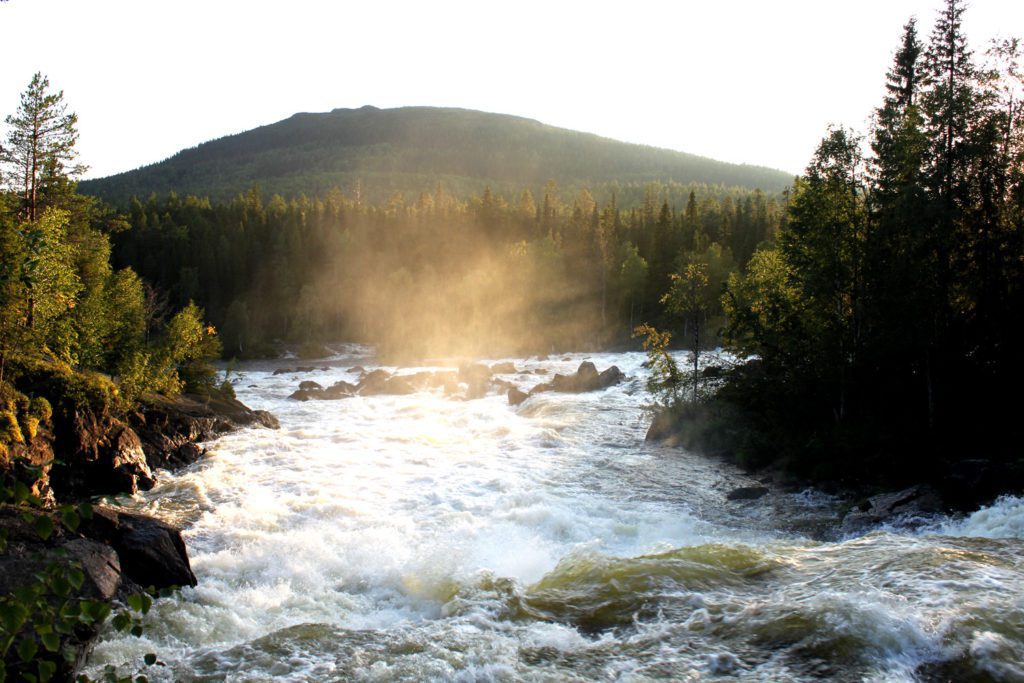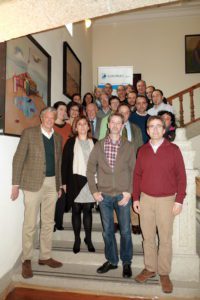Siggen Seminar 2017: Sustainable Agriculture
Biodiversity in agriculture, Waterboard Rivierenland at the Maas-Schwalm-Nette Nature Park, Transboundary park - Germany and the Netherlands
EUROPARC organises annually a Seminar in Gut Siggen, north Germany, thanks to the generosity of the Alfred Toepfer Stiftung F.V.S.. The Siggen Seminars are always an excellent opportunity to exchange knowledge, share experience and establish professional contacts – fundamental activities for those working in the international context of conservation.
Siggen Seminar 2017
Protected Areas for Sustainable Agriculture: Sharing experiences from across Europe that support agriculture in Protected Areas
This year, the Siggen Seminar will run from 10th-13th*March and will focus on Protected Areas promoting Sustainable Agriculture initiatives that:
- contribute to protect habitats and species;
- improve landscape management;
- support the work landowners and farmers, and resulting in high-quality productions.
In particular, we will be looking at some partnership and management practices from France, Italy and Ireland, with inputs from other organisations, with a view to developing new guidance and models to improve the cooperation between protected areas and the farming community.
Our seminars are always fun, lively, interactive and informative. We also aim to make them relevant to the work of Protected Areas and certainly are a valuable chance to learn from others across Europe. We ask participants to come prepared with case studies or example that we can work through.
So, if you have agriculture production in or around your Protected Area and, want to understand and develop more sustainable agriculture practices then this is the seminar for you!
We will also look to the creation of a Sustainable Agriculture commission for EUROPARC to take forward this area of work, developing tools and good practice guidance for the future.
- *IF you are interested in participating in the meeting of the new EUROPARC commission then please foresee a departure on Monday 13th March. All others can depart on Sunday afternoon 12th March. You must indicate this preference at the time of registration in order that we can correctly reserve your accommodation.
The seminar will bring together EUROPARC members, especially from national agencies, regional governments and parks. Participants will meet fellow Protected Area managers from across Europe in a relaxing and fun atmosphere and return back renewed, refreshed and invigorated in their work!
Register for Siggen Seminar 2017
Registration closes on March 1st (or when places are filled)
Places are limited so please book early!
Programme: download the draft programme here
Location: The Siggen Estate (Gut Siggen), Siggen, Germany (more details on how to reach Siggen in the document above, page 4) download the travel information
Costs: The seminar is FREE for members of the EUROPARC Federation. Participants will therefore ONLY cover their own travel to and from the event.
Registration form: download the registration form and send it back to office @ europarc.org.
Alfred Toepfer Natural Heritage Scholarship: Call for applications!
Opportunity for young professionals working for Protected Areas
Each year the EUROPARC Federation, with support from the Alfred Toepfer Stiftung F.V.S., awards three Alfred Toepfer Natural Heritage Scholarships to promising young conservationists, who are committed to working for the benefit of Protected Areas. The aim of the scholarships is to enhance international cooperation and to advance the quality, innovation and European dimension of Protected Area management.
Each scholarship is worth €3.000 and enables successful applicants to undertake a study visit on a particular theme to one or more Protected Areas in a European country. After the trip, the scholars are expected to present the Federation with their findings and a report. These reports are made available to EUROPARC members, as they are full of interesting facts on observation and solutions to common Protected Area management issues.

Who can apply?
Applicants should:
– be under 35 years
– have European nationality from the list of countries
– be employed by a European Protected Area or a nature conservation institution
– or be student or graduate of higher educational institutions, studying an environmentally relevant topic related to Protected Area management
Categories
This year, the categories open for applications are:
1. Biodiversity and Climate Change– Importance of values of N2000 sites and protected areas on reducing impacts of climate change and implementing the EU Biodiversity Strategy
2. Sustainable Development in Protected Areas – contribution to a resource-efficient, green and competitive low-carbon economy
3. Opportunities for Health and Well-being in Protected Areas – Contribution of protected areas to safeguard the European citizens from environment-related pressures and risks to health and wellbeing
4. Parks for People –Approaches and strategies to address local communities and how to involve particular groups into activities or management of protected areas
Candidates should indicate which theme they are choosing in the application form and explain their motivations.
How to apply?
Applications are open from the 6th February to the 28th April. The complete schedule is as follows:
| When? | What? |
| 6th February 2017 | Call for applications open |
| April 28th 2017 | Deadline for applications |
| May 25th 2017 | Notification to selected applicants |
| August 9th 2017 | Deadline for completion of study visits proposals |
| 6th to 10th September 2017 | Awarding ceremony at EUROPARC Conference 2017, Portugal |
| January – December 2018 | Study visits |
Steps for the application:
- Read the guidelines and check if you are eligible (in particular in the list of countries)
- Fill in the application form here
- Create an outline of your travel plan, where possible with contacts and confirmation
- Send it to l.monteiro@europarc.org before the 28th April
Need an example of a successful application?
Example motivation and application I
Example motivation and application II
Need inspiration?
Find out about the past editions of the Alfred Toepfer Natural Heritage Scholarship and read the previous award winners’ reports!
Water Governance Across Europe: the EU Water Framework Directive
Water Governance Across Europe: In Light of the Review of the EU Water Framework Directive
01.02.2017, European Parliament Brussels
The Water Framework Directive (WDF) is EU’s forefront legislative instrument to protect European water resources. However, the achievement of the “good status” for EU waters as laid down in the WFD lags behind. To understand implementation gaps, the issue of governance is a key aspect to look at.
In order to discuss the main issues related to water governance at European level, to propose solutions and to address challenges such as climate change and water security the MEP Michel Dantin, organised the event “Water Governance Across Europe: In light of the Review of the EU Water Framework Directive”. The event took place in the European Parliament, last Wednesday, and counted with over 50 participants. Stefania Petrosillo, EUROPARC Policy Officer, represented the Federation in the meeting and shares with us the main topics discussed.
Water Management at a national and regional level
According to the European Commission, the Water Directive is working quite well at national level, and Member States and authorities are willing to implement it, even if many aspects have to be improved. However, some member States who have include directives in their legislation, also reduce funds and human resources, making difficult the appropriate implementation of the legislation in the ground (e.g. France).
Water governance is strictly interconnected with, and affected by, administrative and territorial reforms ongoing in many member States (e.g. in France and Italy), such as changing the administrative structures (regions, municipalities, etc.); creating new and different authorities and altering the roles and responsibilities on water issues. Thus leading to legal uncertainty, loss of administrative know-how and poorer implementation of the Water Directive Framework.
Challenges and… solutions?
Water is vital for survival and impacts many different sectors – from privates and families, to farmers, or big industries. How to manage this demand and possible competition? And the scenario gets worse, as drinking water is a decreasing resource, and it is specially complex to manage in urban areas. How to guarantee the general access to water, despite the costs of service and infrastructures, specially relevant in Europe’s current financial situation?
However, before all other questions, comes the critical one: how to manage/stock it, preserving the environment and biodiversity? The management of common water resources across borders, as for example what is being done with the Danube river, can be of good inspiration to other European areas. Natura 2000 and national and regional Protected Areas play a crucial role in protection of the resource.
 Kivakkakoski water fall © Paanajärvi National Park, Russia
Kivakkakoski water fall © Paanajärvi National Park, Russia
More than ever, cooperation and creative solutions are needed. Stakeholders involvement and awareness raising was one of the main points of discussion, however, indicators to monitor and evaluate the efficacy of the different governance models are lacking. The need to have better scientific data, accessible and liable, was also mentioned as necessary for decision making.
Water Policy in Brussels
Water is absolutely connected with many other policies, hence way coherence in needed. At a Commission level, for example, the Commissionaires responsible for Agriculture and Rural Development (Commissionaire Hogan) and Environment, Maritime Affairs and Fisheries (Commissionaire Vella) are already working together on the topic, and pushing other DGs to work closer. The Water use policy is also linked with Circular Economy and the European Commission is already promoting initiatives for reusing water in agriculture.
Kkeynote speakers mentioned also how international solidarity is ethically mandatory with no-European countries affected by lack of access of water.
MEP Michel Datin, organiser of the event and the Chair of the “Agriculture & Water Management” Working Group of the EP Intergroup on “Climate Change, Biodiversity and Sustainable Development”, referred that unfortunately water is considered by elected politicians (MEP, local mayors etc.) a technical issue and not a crucial political issue: it is necessary to increase the politicians awareness.
Datin closed the event with some recommendations:
- transparency and access to data is needed, and collaboration with scientific;
- solidarity among all public and private sectors, as well as within the same sectors (e.g. industry) is needed;
- coherence among policies is needed;
- it is necessary to find way to evaluate the administration results and governance.
Downloads
Agenda; List of participants; Presentations available:
Water governance across Europe in light of the review of the WFD, Bruno Tisserand, EurEau President
Water Governance – Bridging the gap between policy and implementation, Alejandro Iza, Environmental Law Programme
Final official report: will be available soon
EUROPARC Spain: new President and Council elected today
(left to right) Eulàlia Comas Lamarca, Treasurer; Rafael Mata Olmo, President; Amaia Barredo Martín, Vice-president, at EUROPARC Spain General Assembly 2017
Rafael Mata Olmo is the new President of EUROPARC Spain
Download here the Spanish press release
Today, members of EUROPARC Spain gathered in Madrid for the General Assembly, to vote for the new Council. Rafael Mata Olmo, a recognised expert in Protected Areas, was elected President of the Council, becoming the 7th elected President since the foundation of EUROPARC Spain, in 1993.
Rafael Mata Olmo will now replace Carles Castell, who have led the Council for the past 4 years.
The Council members elected today were:
- Mr. Rafael Mata Olmo, President. Geography Professor at the Autonomous University of Madrid
- Mrs. Amaia Barredo Martín, Vice-president. Environment and Urbanism Director at Álava’s Provincial Council.
- Mrs. Eulàlia Comas Lamarca, Treasurer and Secretary. Technician at the Directorate-General on Environmental Policy at the Regional Government of Catalunya.
- Mr. José Ángel Arranz Sanz, vocal. Director General of Environment at Junta de Castilla y León.
- Mr. Francisco Javier Madrid Rojo, vocal. Director General of Environment and Protected Areas at Junta de Andalucía.
- Mr. Aitor Zulueta Tellería, vocal. Director of Environment and Land planning at the Basque Government.
- Mr. Basilio Rada Martínez, vocal. Director of the National Parks Administration at the Ministry of Agriculture, Fishing, Food and Environment.
- Mr. Antonio López Lillo, vocal. President of Honor of EUROPARC-España.
- Marta Múgica de la Guerra, vocal. Director of the “Fundación Fernando González Bernáldez” and Coordinator of EUROPARC Spain.
About Rafael Mata Olmo
Professor of Regional Geographic Analysis at the Autonomous University of Madrid, Rafael Mata is a specialist in the study of rural systems and landscapes and in land planning, landscape and nature conservation policies in Spain and Latin America. He has been the President of the Association of Spanish Geographers and the Spanish Committee of the International Geographical Union (2005-2009), and editor and promoter of the manifesto “Por una nueva cultura del territorio” (“For a new territory culture”).
He has collaborated with numerous public administrations in the elaboration of territorial planning plans, landscape guidelines and urban planning proposals (in Andalusia, Cantabria, Canarias, Extremadura, Madrid, Mallorca, Menorca, Murcia, Basque Country, Valencia). Mr. Olmo has collaborated with EUROPARC Spain in the framework of its first Action Plan and in the Monograph on “integration of protected natural spaces in land management”. He has developed research projects and directed doctoral thesis in protected areas of Paraguay, Chile, Argentina and Bolivia.
Past, Present, Future
During the General Assembly, a great focus was given to the programme “Society and Protected Areas 2020”, which consists in the creation of strategic partnerships to promote social benefits arising from nature conservation. The Strategic Plan of the Programme was introduced to EUROPARC Spain members: it identifies the present and future needs based on more than 20 years of experience, and the highlights the changes that are envisaged in the medium-term.
Rafael Mata Olmo highlighted the need to intensify efforts in the approach and collaborative work with all entities and groups involved in protected areas,
and added that the emphasis should be on “showing and enhancing the multiple benefits that protected areas provide to society.”
The priority lines of the Society and Protected Areas Programme are:
- Integration of protected areas in the territory
- Ecosystem services for human well-being
- Transfer of scientific knowledge to PA management
- Strategic communication to increase social and political support
- Diversification of governance models
- Diversification of financing models
- Harmonisation of sectoral policies
- Global responsibility and international cooperation

General Assembly – EUROPARC Spain 2017
Members have also approved the main activities for 2017, which include:
LIFE RedBosques. Knowledge and training networks for the effective management of Mediterranean forest habitats of the Natura 2000 Network in Spain, in which the Generalitat de Catalunya, the Center for Ecological Research and Forest Applications (CREAF) and the Catalunya-La Pedrera Foundation are partnering.
Integration of adaptation to climate change in the planning and management of protected areas in Spain, supported by the Spanish Office of Climate Change.
European Charter for Sustainable Tourism in Protected Areas, an initiative in which 44 protected natural areas and more than 400 tourist companies are involved, and which is also being joined by travel agencies.
2017 is a special year for elections: EUROPARC Federation will also have their members voting for the election of Council and President. EUROPARC General Assembly 2017 will take place in Portugal, on the 6th September at EUROPARC Conference 2017.